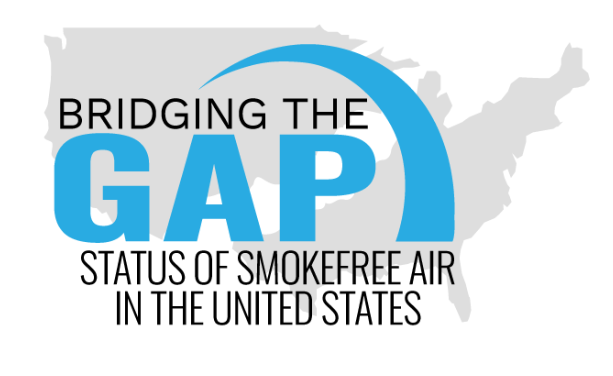New Jersey’s 25,000 casino workers still exposed to secondhand smoke
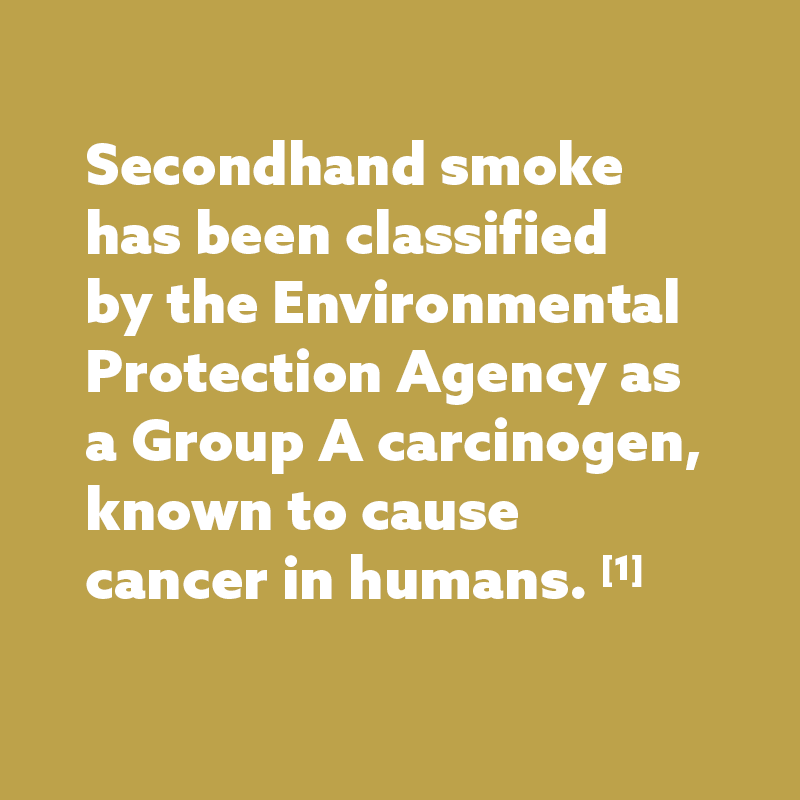
New Jersey, the Garden State, is home to 8.9 million residents. On April 15, 2006, the state legislature passed a smokefree law applying to all workplaces, restaurants, bars. Under pressure from the casino and tobacco industry, the law still permitted indoor smoking in casinos, leaving the largest hospitality workplaces in New Jersey exposed to secondhand smoke.
- New Jersey casinos successfully operated smokefree for more than a year due to COVID-19 health and safety protocols, ensuring a safe environment for the state’s 25,000 gaming employees.
- New Jersey’s casino workforce is incredibly diverse. Secondhand smoke impacts generations of women (including pregnant women) and people of color working in the casino hospitality service industry.
- Casinos are large workplaces, employing thousands of people each. Casinos should ensure a safe work environment just like every other employer in the state.
- The smoking rate for NJ adults is below the national average at 11.4% yet disparities persist in secondhand smoke exposure. (See AHR breakdown of NJ smoking rates by sub-groups) Tobacco remains the leading preventable cause of death in New Jersey.
- Smoking costs all New Jersey residents with $4.1 billon per year in healthcare related costs (Source 1)
- Closing the casino loophole in the state clean indoor air act will protect the health of workers and families.
Preemption Status:
Not Preempted
State law does not preempt local governments from adopting smokefree air laws. Preemption refers to situations in which a law passed by a higher level of government takes precedence over a law passed by a lower one. In such cases, preemptive state laws set a ceiling, rather than a floor, and do not allow local authorities to enact strong local laws.
Secondhand Smoke Exposure Comes at a Cost
Tobacco use is the leading preventable cause of death in the United States. More than 480,000 people die from smoking or exposure to secondhand smoke each year. [Source 2: US Department of Health and Human Services. The health consequences of smoking: 50 years of progress. A report of the Surgeon General. Atlanta, GA: US Department of Health and Human Services, CDC; 2014.]
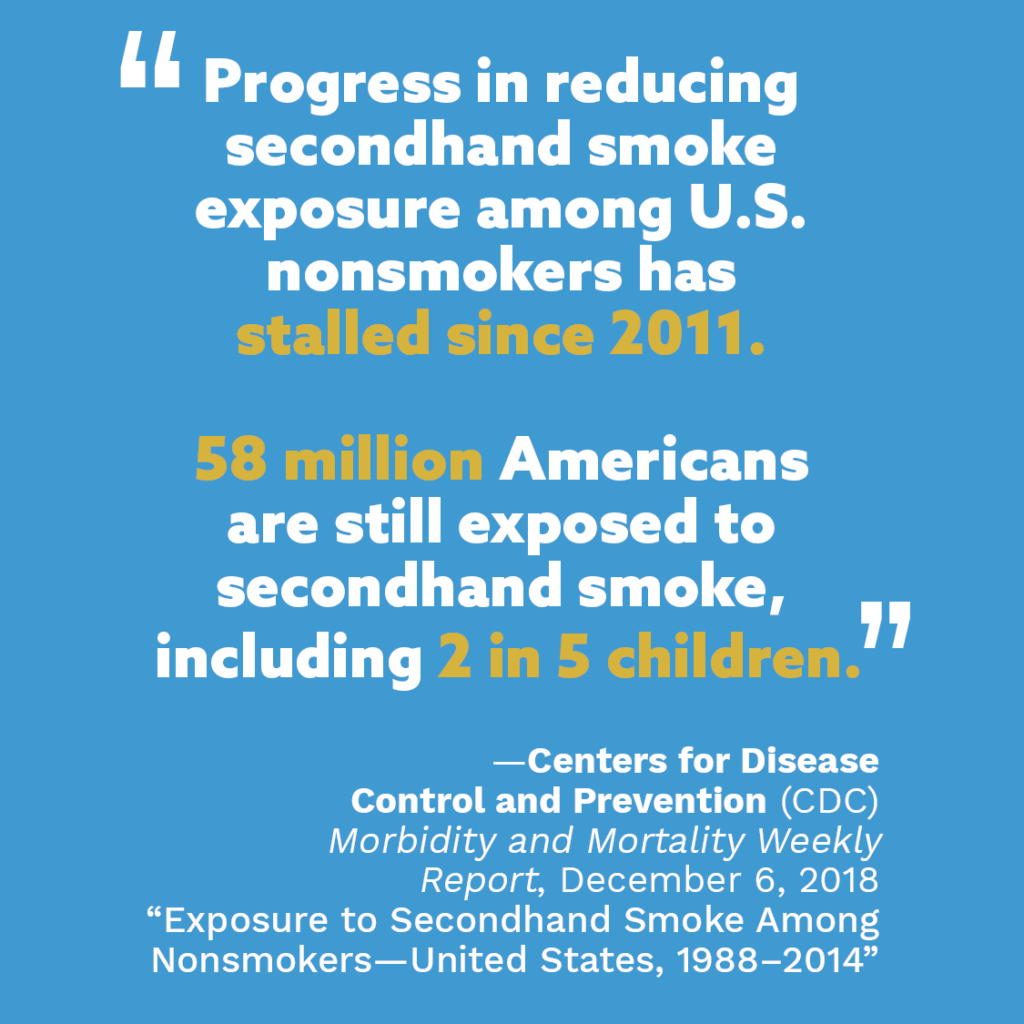
Casino workers are exposed to secondhand smoke every day
Tobacco exacts a toll in New Jersey
11,400 New Jersey residents die each year of tobacco-related illness. Annual health care costs in the state directly caused by tobacco use are $4.06 billion. [Source 1, repeat]
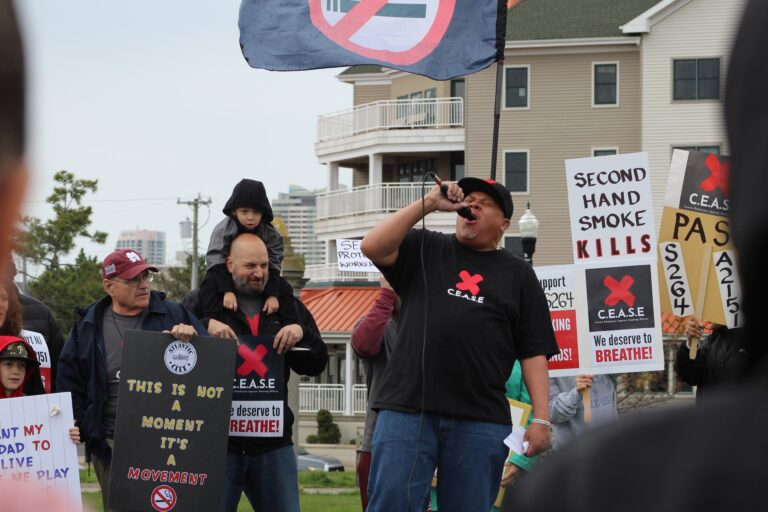
“The smoke had always bothered me, but I dealt with it quietly, even while nervously working through two pregnancies. I’ll never forget working in a high roller room with six VIPs smoking cigars and I had to just stand there and deal. It was awful. But I did my job, anxiously wondering what hand was being dealt to my unborn child inside of me.”-Atlantic city casino worker
Who is Left Behind?
Those exposed to secondhand smoke in New Jersey often feel invisible. They are more likely to work in the hospitality industry, identify as LGBTQ, and be a member of an ethnic minority. Individuals in these groups are often marginalized in the political process. Casino employees have organized to speak out on the inequity of being forced to breathe toxic secondhand smoke at work; the only workers in New Jersey that are required to do so and thus choose between their health and paycheck.
Secondhand smoke exposure causes heart disease, stroke, and lung cancer among adults, as well as respiratory disease, ear infections, sudden infant death syndrome, more severe and frequent asthma attacks, and slowed lung growth in children. [3,4]
Smokefree laws help to reduce adult smoking prevalence and prevent youth and young adult smoking initiation. [3,4]
Beyond secondhand smoke exposure, nonsmokers exposed to thirdhand smoke in a casino are at an even higher risk than those in a thirdhand smoke-polluted home. Further, hospitality workers and children are susceptible to thirdhand smoke exposure, as the particles cling to hair, clothing, and cars. Young children are particularly vulnerable because they can ingest tobacco residue by putting their hands in their mouths after touching contaminated surfaces. [5]
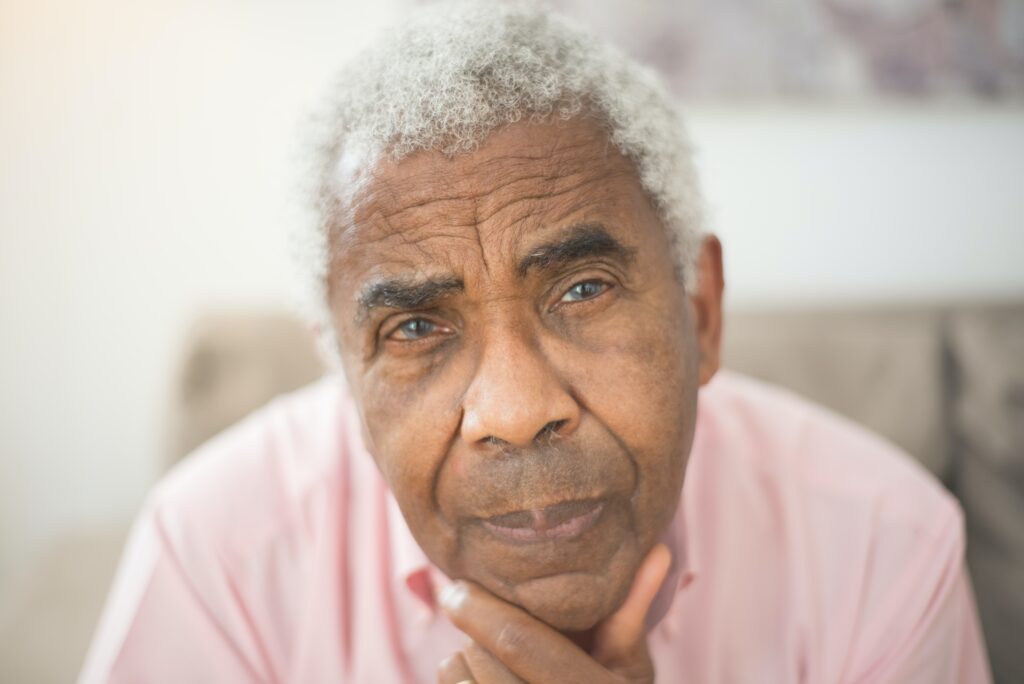
All New Jersey residents are paying the cost of smoking and secondhand smoke related health costs.
Current Landscape of Smokefree Protections
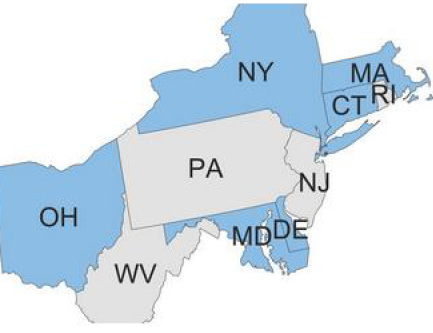
New Jersey is in proximity to numerous states which already have strong statewide smokefree laws that require state-regulated (non-tribal) gaming to be smokefree indoors, such as Delaware, Massachusetts, Maryland, New York, and Ohio. [2] In West Virginia, some casinos are smokefree, by local law. Blue states on the map above represent a statewide law requiring 100% smokefree state-regulated gaming (horse-racing, card-rooms, casinos, etc.) Grey states represent no statewide law requiring 100% smokefree state-regulated gaming. Note that the map does not reflect American Indian sovereign tribal policies.
Close the loophole in statewide smokefree law: New Jersey’s statewide smokefree law applies to all workplaces, restaurants, bars – including use of e-cigarettes and marijuana – but exempts casinos leaving thousands of workers and patrons exposed to secondhand smoke. Even though casino gaming is limited to one geographic area, a statewide law that applies to gaming will ensure all current and any future commercial gaming properties are 100% smokefree.
In 2006, most New Jersey workers finally had a smokefree workplace, except for the casino workers.
In 2008, Atlantic City briefly had a local law for smokefree casinos, but it was rescinded after just one month due to casino industry lobbying pressure. At the time, gaming revenue was declining due to the global financial crisis and gaming expansion into neighboring states such as Pennsylvania and Maryland.
In 2020, the state’s casinos closed during the pandemic and were required to reopen smokefree under the Governor’s COVID-19 health and safety guidelines. Casinos were successfully smokefree indoors for more than a year, then indoor smoking resumed as COVID guidelines were dropped. Thousands of casino workers organized to advocate for closing the casino smoking loophole in the state law.
As of March 2022, legislation has been introduced to finally close the casino loophole and extend smokefree protections too 100% of New Jerseyans. Hundreds of casino workers have engaged in the fight for smokefree air speaking out about their ongoing exposure to secondhand smoke at work.

Surgeon General
The 2006 U.S. Surgeon General’s Report, The Health Consequences of Involuntary Exposure to Secondhand Smoke, concluded that separating smokers from nonsmokers, air cleaning technologies, and ventilating buildings cannot eliminate secondhand smoke exposure, stating that conventional air cleaning systems cannot remove all the poisons, toxins, gases, and particles found in secondhand smoke. And heating, ventilation, and air conditioning systems can in fact distribute secondhand smoke throughout a building. The report affirms that there is no safe level of exposure to secondhand smoke. Even a little exposure causes significant health risks such as heart disease, stroke, and cancer. [2]
ASHRAE
The American Society of Heating, Refrigerating and Air-Conditioning Engineers (ASHRAE), the national standard-setting body for indoor air quality, including ventilation issues, is in agreement that casino ventilation systems do not and cannot address the health hazards of secondhand tobacco or marijuana smoke, or secondhand aerosol from e-cigarettes. [6]
NIOSH
Indoor air quality assessments conducted by the National Institute for Occupational Safety and Health in smoke-filled casinos and cotinine biomarker tests with casino workers proved that there is significant exposure to secondhand smoke, even in casinos that tout the use of sophisticated ventilation systems. NIOSH’s conclusion: “Based on the known link between ETS [secondhand smoke] and health effects, NIOSH investigators recommend establishing casino-wide no smoking policies.” [7]
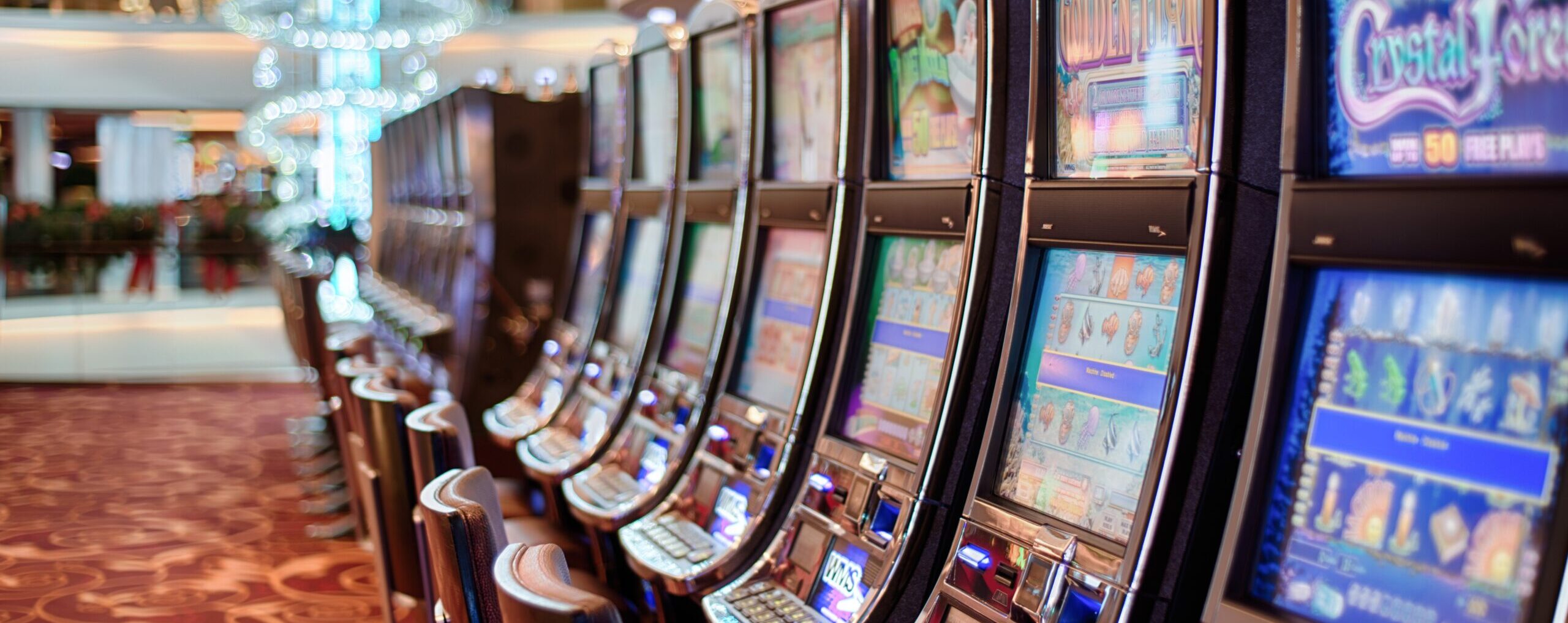
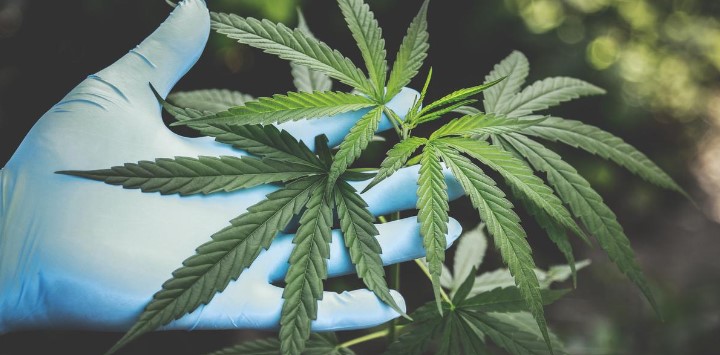
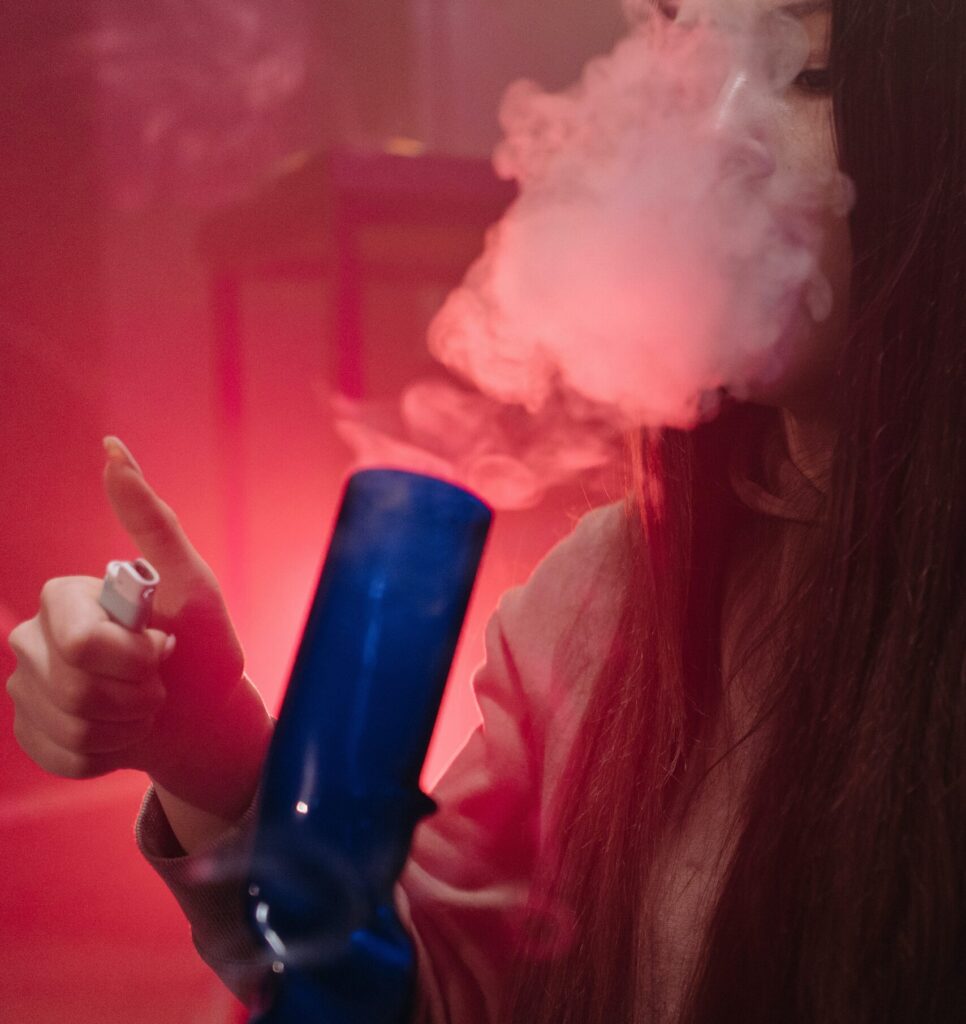
New Challenge: Secondhand Marijuana Smoke
New Jersey legalized recreational marijuana in April 2022. Secondhand marijuana smoke is a health hazard for nonsmokers. Just like secondhand tobacco smoke, marijuana smoke is a potent source of PM 2.5 fine particulate matter, which can be breathed deeply into the lungs and can cause lung irritation and asthma attacks, and makes respiratory infections more likely. Exposure to fine particulate matter can exacerbate health problems especially for people with respiratory conditions like asthma, bronchitis, or Chronic Obstructive Pulmonary Disease (COPD). Marijuana secondhand smoke also impacts cardiovascular function; it contains thousands of chemicals and at least 33 carcinogens.
If marijuana smoking is brought indoors, a new class of hospitality employees working in the marijuana industry will be exposed to secondhand smoke at a much higher rate than the general public and will suffer the negative health effects of that exposure..
First of its kind study demonstrates that casino visitors, even current smokers, desire smokefree spaces.
“When smoking is allowed in indoor areas of casinos, millions of nonsmoking casino visitors and hundreds of thousands of employees can be involuntarily exposed to secondhand smoke and related toxicants.” [12]
—Office on Smoking and Health, Centers for Disease Control and Prevention
A recent study found that 75% of U.S. adults who visit casinos favor smokefree casinos.
No prior studies have exclusively assessed adult attitudes toward smokefree casinos in the United States.
This study found very high favorability among those age >64 (81.6 %), college educated (81.7%), and higher income (79.1/80.8%). Smokers made up 13% of the sample, and, of those smokers, nearly half (45%) supported smokefree casinos. [12]
COVID Reminds Us That Health Promotion Policies Matter
Smoking and vaping, along with exposure to secondhand smoke and aerosols, negatively impact the respiratory system and may cause a person’s immune system to not function properly, known as being immunocompromised. Research demonstrates that current and former smokers of any age are at higher risk of severe illness from coronavirus disease (COVID) in part due to compromised immune and/or respiratory systems. Smoking leads to cardiovascular disease, as well as respiratory illnesses including bronchitis, asthma, Chronic Obstructive Pulmonary Disease (COPD), and lung cancer as a result of exposure to particulate matter, toxins, and carcinogens into their lungs. Secondhand tobacco and marijuana smoke and aerosol contain many of the same toxins, carcinogens, and particulate matter that lead to respiratory and cardiovascular diseases.
Removing masks to smoke or vape indoors undermines the proven benefit of face coverings and increases the risk of transmitting or inhaling COVID via infectious respiratory droplets, uncovered coughs, and increased touching of faces. Preventing exposure to secondhand smoke and e-cigarette aerosol or vape by adopting a smokefree policy with no smoking or vaping indoors and moving smoking or vaping to socially distanced outdoor areas away from entrances, could help mitigate worker and public exposure to carcinogens and toxins, as well as COVID.
Just as social distancing and handwashing help prevent the spread of disease, eliminating secondhand smoke is critical to prevent acute and chronic diseases, and saves lives by reducing the risk of heart disease, stroke, respiratory diseases, and lung cancer by up to 30% at a population wide level.
Going smokefree prevents exposure to the carcinogens and toxins in secondhand tobacco and marijuana smoke as well as dramatically reduces the spread of respiratory droplets that could transmit flu and other viruses like COVID.
Strategies to Close Gaps & Increase Health Equity
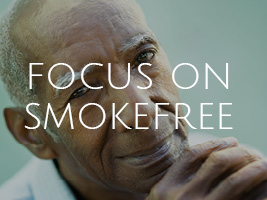
Focus on smokefree policies: Stay focused on closing the casino smoking loophole especially in the context of health post-pandemic: Competing policies can distract and delay work on smokefree policies. Smokefree laws have immediate and long-term health and economic benefits, and are worth the investment of time and effort to protect everyone from exposure to a known human carcinogen. Strengthening the statewide smokefree law will require highly organized, concentrated efforts to build decision maker support and create a sense of urgency to act to make all workplaces smokefree.
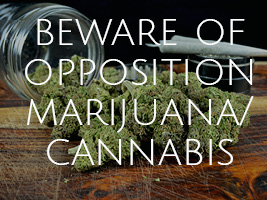
Beware of opposition from cannabis/marijuana proponents: Marijuana smoke is also a form of indoor air pollution and a hazard to nonsmokers’ health. Workplaces in New Jersey are currently protected from marijuana secondhand smoke and aerosol but advocates must remain on the watch for industry interference and the threat of roll backs.

Invest in the future: In order to address gaps in smokefree coverage, a great deal of effort and financial resources will be required to explain the ongoing disparities in smokefree protections and the benefits of 100% smokefree environments, and to counter misinformation from the tobacco industry about the necessity of compromise in the appropriate role of government in providing smokefree workplaces to protect all employees and patrons. Collaborating with and mobilizing additional community-based partners who represent workers being left behind is critical to reach success.

Increase funding and resources: Tobacco prevention, education, training, and cessation funds are needed to better address disparities in smoking and exposure to secondhand smoke. In addition, funds to support the implementation of a statewide law are critical to increase community awareness of and compliance with the smokefree rules. The American Nonsmokers’ Rights Foundation is dedicated to improving community health and increasing health equity by ensuring that everyone is protected by a 100% smokefree law. We provide training, technical assistance, and tobacco policy surveillance data for civic engagement to improve community health.
Every Worker Has the Right
to Breathe Clean Air

Sources of Data:
- Centers for Disease Control and Prevention. (n.d.). State Highlights: New Jersey[from State Tobacco Activities Tracking and Evaluation System].
- US Department of Health and Human Services. The health consequences of smoking: 50 years of progress. A report of the Surgeon General. Atlanta, GA: US Department of Health and Human Services, CDC; 2014.
- US Department of Health and Human Services. Preventing tobacco use among youth and young adults. A report of the Surgeon General. Atlanta, GA: US Department of Health and Human Services, CDC; 2012
- Matt, Dr. Georg (2018). Smoking Bans May Not Rid Casinos of Smoke. US News and World Report
- Matt, G E, Quintana PJ E, Hovell MF et. al. (2004). Households contaminated by environmental tobacco smoke: sources of infant exposures. British Medical Journal: Tobacco Control.
- ASHRAE Position Document on Environmental Tobacco Smoke.
- National Institute for Occupational Safety and Health (NIOSH) Environmental and Biological Assessment of Environmental Tobacco Smoke Exposure Among Casino Dealers, Chandran Achutan, PhD, Christine West, RN, MSN, MPH, Charles Mueller, MS, Yvonne Boudreau, MD, MSPH, Kenneth Mead, PhD, PE. Health Hazard Evaluation Report, HETA 2005-0076; 2005-0201-3080 Bally’s, Paris, and Caesars Palace Casinos, Las Vegas, Nevada, May 2009.
Related Reading:
Huang, J., King, B.A., Babb, S.D., Xu, X., Hallett, C., Hopkins, M. (2015). Socio-demographic disparities in local smokefree law coverage in 10 states. American Journal of Public Health, 105(9), 1806–1813.
Tynan, M.A., Baker Holmes, C., Promoff, G., Hallett, C., Hopkins, M., & Frick, B. (2016). State and local comprehensive smoke-free laws for worksites, restaurants, and bars — United States, 2015. Morbidity and Mortality Weekly Report, 65(24), 623-626.
United Health Foundation. (2021). America’s Health Rankings Annual Report.
[n.a.], “Tobacco industry interference with tobacco control,” Geneva: World Health Organization (WHO), 2008.
NCI Monograph 17: Evaluating ASSIST – A Blueprint for Understanding State-level Tobacco Control Evaluation of American Stop Smoking Intervention Study for Cancer Prevention Chapter 8, Evaluating Tobacco Industry Tactics as a Counterforce to ASSIST (October 2006).
July 2022
